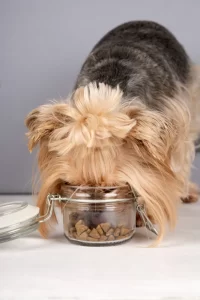Table of Contents
Nutrition Nuggets: Feeding Your Yorkie for Optimal Health
Hey there, fellow Yorkie lovers! As a proud owner of a Yorkshire Terrier myself, I understand the importance of providing our furry friends with the best nutrition possible. Just like us, our Yorkies need a balanced diet to thrive and live their best lives. In this blog post, I’m going to share some valuable insights into how to feed your Yorkie for optimal health. From choosing the right food to portion control and special dietary considerations, let’s dive into the world of nutrition for our beloved pups!
Understanding Your Yorkie’s Nutritional Needs
First things first, before we delve into specific dietary recommendations, it’s essential to understand the nutritional needs of our Yorkshire Terriers. These pint-sized pups have unique requirements compared to larger breeds due to their small size and energetic nature. As a result, their diet should be rich in protein, moderate in fat, and packed with essential vitamins and minerals to support their overall health and well-being.
Protein is particularly crucial for Yorkies as it helps maintain their lean muscle mass and supports healthy growth and development. Look for high-quality protein sources such as chicken, turkey, beef, or fish when selecting a commercial dog food for your furry friend. Additionally, keep an eye out for foods that contain omega-3 fatty acids, which can help promote a shiny coat and healthy skin.
Fiber is another essential component of your Yorkie’s diet as it aids in digestion and helps regulate bowel movements. Opt for dog foods that contain wholesome grains like brown rice or barley, as well as fibrous fruits and vegetables such as carrots, sweet potatoes, and green beans. These ingredients not only provide valuable nutrients but also contribute to your pup’s overall digestive health.

Choosing the Right Dog Food
With so many options available on the market, choosing the right dog food for your Yorkie can be overwhelming. However, there are a few key factors to consider that can help you make an informed decision. First and foremost, opt for a dog food that is specifically formulated for small breeds like Yorkshire Terriers. These formulas are designed to meet the unique nutritional needs of small dogs and often come in smaller kibble sizes, making them easier for your pup to chew and digest.
When examining the ingredients list, prioritize whole foods and avoid artificial additives, fillers, and by-products. Look for named protein sources (e.g., chicken meal, salmon, or lamb) listed at the top of the ingredients list, indicating a higher concentration of quality protein. Additionally, choose dog foods that are fortified with vitamins, minerals, and antioxidants to support your Yorkie’s overall health and immune system.
Consider your Yorkie’s age, activity level, and any specific dietary requirements or sensitivities when selecting a dog food formula. Puppies, adult dogs, and seniors have different nutritional needs, so be sure to choose a formula that aligns with your pup’s life stage. If your Yorkie has food allergies or sensitivities, opt for limited ingredient or hypoallergenic dog foods that are free from common allergens such as wheat, corn, and soy.

Portion Control and Feeding Schedule
Maintaining a healthy weight is crucial for your Yorkie’s overall health and longevity. As small breeds, Yorkies are prone to weight gain if overfed or given too many treats, which can lead to obesity and related health issues. To prevent this, practice portion control and establish a regular feeding schedule for your pup.
Consult with your veterinarian to determine the appropriate portion size for your Yorkie based on factors such as age, weight, activity level, and metabolic rate. Divide your dog’s daily portion into two or three smaller meals to prevent overeating and aid in digestion. Avoid free-feeding or leaving food out all day, as this can encourage overeating and make it difficult to monitor your pup’s food intake.
In addition to controlling portion sizes, be mindful of the type and frequency of treats you give your Yorkie. While treats can be a fun way to reward good behavior or provide enrichment, they should be given in moderation and accounted for in your pup’s daily caloric intake. Opt for healthy, low-calorie treats such as small pieces of fresh fruits or vegetables, lean meats, or commercial treats specifically designed for small breeds.
Hydration is Key
Just like humans, staying hydrated is essential for your Yorkie’s health and well-being. Adequate water intake is necessary to support proper digestion, regulate body temperature, and maintain overall hydration. Make sure your pup has access to fresh, clean water at all times, and monitor their water intake to ensure they’re staying properly hydrated.
In addition to providing water during meal times, consider incorporating wet or moistened dog food into your Yorkie’s diet to increase their moisture intake. This can be especially beneficial for picky eaters or dogs who may not drink enough water on their own. If you’re concerned about your Yorkie’s hydration levels, consult with your veterinarian for personalized recommendations and guidance.

Special Dietary Considerations
While most Yorkies can thrive on a balanced commercial dog food diet, some may require special dietary considerations due to underlying health conditions or sensitivities. If your pup has food allergies, digestive issues, or other medical concerns, work closely with your veterinarian to develop a customized feeding plan that meets their unique needs.
In some cases, your vet may recommend a prescription or therapeutic diet formulated to address specific health issues such as allergies, gastrointestinal disorders, or urinary tract issues. These specialized diets are designed to provide targeted nutrition and support your Yorkie’s overall health and well-being. Additionally, your vet may recommend dietary supplements or probiotics to further support your pup’s health and address any nutritional deficiencies.

Monitoring Your Yorkie’s Health
In addition to providing a balanced diet, it’s essential to monitor your Yorkie’s health and make adjustments to their diet as needed. Keep an eye on their weight, body condition, coat quality, and overall energy levels, as these can all be indicators of their nutritional status and overall health. If you notice any changes or abnormalities, consult with your veterinarian for further evaluation and guidance.
Regular veterinary check-ups are also crucial for ensuring your Yorkie stays happy and healthy. Schedule annual wellness exams with your vet to assess your pup’s overall health, discuss any concerns or questions you may have, and receive personalized recommendations for their diet and care. By working together with your veterinarian, you can ensure that your Yorkie receives the best possible nutrition and support for a long and healthy life.
Conclusion
Feeding your Yorkie for optimal health involves more than just filling their bowl with food. It requires careful consideration of their nutritional needs, choosing the right dog food, practicing portion control, and monitoring their health closely. By prioritizing your pup’s nutrition and well-being, you can help them live a long, happy, and healthy life by your side.
Remember, every dog is unique, so what works for one Yorkie may not work for another. Pay attention to your pup’s individual preferences, dietary requirements, and health status, and adjust their diet accordingly. With proper nutrition and care, your Yorkie can enjoy a lifetime of tail wags, belly rubs, and endless cuddles!





